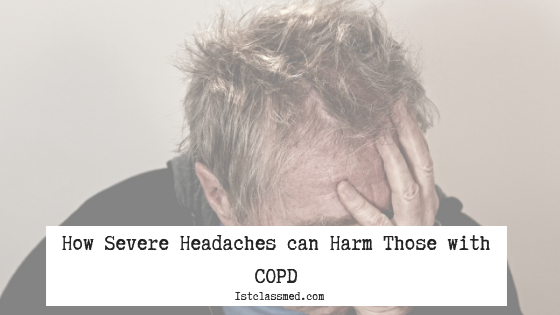
There is often a reason why we get headaches, not enough water, too much alcohol, lack of sleep or even certain foods.
Your medical condition can also be a factor in why you are suffering from headaches more often than you had been previously.
These headaches are called secondary headaches, as they are a result of another condition or disease.
Diseases such as COPD (chronic obstructive pulmonary disease) can reduce the amount of oxygen the body receives, which can result in less oxygen to the brain.
The cause of headaches can differ and may not always be because of low oxygen levels, so talking with your doctor can help find a cause.
How Can COPD Cause Headaches?
COPD is a broad term for conditions or diseases that can cause difficulty breathing and lung/airway complications.
This difficulty breathing can cause less oxygen that gets into the lungs and into the blood as well as remove carbon dioxide from the body.
COPD can cause hypoxia or hypercapnia, which are both very serious conditions that can hurt your body.
Hypoxia is when your blood does not have enough oxygen in it, common for those with COPD.
Hypercapnia is when your body cannot expel enough carbon dioxide, retaining it in your blood.

Headaches commonly occur in those with COPD as there is not enough oxygen going to your brain and there is too much carbon dioxide in your blood as well.
Blood vessels within the brain, with little oxygen and high levels of carbon dioxide expand, as they need more oxygen.
This expansion of blood vessels in the brain causes the morning headache.
Secondary headaches for COPD patients often occurs in the morning after waking up, as there can be a buildup of carbon dioxide in your sleep.
These morning headaches for those with COPD can also be caused by sleep apnea.
Sleep apnea is when an individual stops breathing in their sleep, and then resumes, multiple times throughout the night.
This can also lower the amount of oxygen getting into the body and increase the amount of carbon dioxide building up in the blood.
Can Supplemental Oxygen Cause Headaches?
Some people with supplemental oxygen have to have it 24-hours a day, resulting in them getting oxygen throughout the night.
More often than not, a set amount of oxygen per minute (LPM: liter per minute) is prescribed for 24-7 use.
The set amount of oxygen can be too much overnight (or in general) and can actually cause your body to have too much oxygen in the blood.
Too much oxygen in the blood can be harmful to the brain, as the brain cannot handle a plethora of oxygen.
Too much oxygen in the brain can lead to oxygen toxicity, which can cause seizures, unconsciousness and even damage to the lungs.
Symptoms with a COPD Headache
As headaches can occur in those with or without COPD, it is important to determine the cause of your headaches.
Common symptoms of headaches in those with COPD are:
- Chest pains
- Wheezing
- Extreme shortness of breath
- Choking when waking up
- Quick breathing
- Common symptoms of headaches for those with hypoxia are:
- Increased heart rate
- Increased blood pressure
- Possible red/purple-toned skin spots
Treatment Options
Your doctor may recommend a handful of treatment options to help relieve COPD-related headache.
Oxygen Therapy:
More often than not, those who are suffering from low oxygen levels in the blood and get headaches need supplemental oxygen.
This can help make your oxygen levels normal throughout the night and should hopefully help prevent any morning headaches from low oxygen.
If you still suffer from morning headaches even with supplemental oxygen, there may be another reason why you are waking up with headaches.
You may not be getting enough sleep, or you could be suffering from sleep apnea, if you still suffer from headaches speak with your doctor about the next step.
Medications:
There are many medications that can help treat COPD symptoms, such as bronchodilators, and inhaled/oral steroids.
Bronchodilators supply inhaled medications that help relax the airways, resulting in easier breathing, less coughing and less shortness of breath.
Inhaled/oral steroids can help reduce inflammation and be used as a preventative method of preventing flare-ups.
It is common for these steroids to be prescribed to those with severe flare-ups, sadly long-term use can cause unfavorable side effects.
Medications can help keep your lungs open so you can get oxygen into your body and hopefully prevent headaches.
Pain Management:
COPD symptom medications may not resolve headaches, so you may have to resort to pain medications or over-the-counter (OTC) medications.
It is most likely easier to get pain medications specifically for headaches versus trying to solve it through COPD medications.
There is a risk with taking OTC pain medication for an extended period of time, so it is often recommended to take the medication no more than two times a week.
If you are feeling symptoms more often than that, you can try alternative methods to ease symptoms.
Some methods to relieve headaches naturally can include, breathing exercises, genuine peppermint tea, peppermint oil, sleeping on a supportive & comfortable pillow, and exercising regularly.
Though natural solutions do not sound as appealing as taking a pill, it can help prevent any damage to your liver and kidneys.
Your doctor will know the best path for you, as everyone is different and there may be a medication that works for you but not for someone else.
Sleep Apnea:
If sleep apnea is the cause of your morning headaches, trying to treat it may be the best solution to resolving headaches.
Sleep apnea can cause hypoxia over time, which can lead to the very painful morning headaches.
A CPAP is often prescribed to those with sleep apnea as it opens the airways overnight while you are asleep.
A study done in 1995 found that a CPAP machine showed it improved breathing patterns in those with COPD.
For those who get admitted to the ICU (intensive care unit), a CPAP machine can rid the need for intubation and conventional mechanical ventilation.
Conclusion
More often than not morning headaches are caused by a lack of oxygen for those with COPD.
COPD morning headaches can be painful and debilitating but speaking with your doctor and doing research can help determine what could be the problem.
There are many different causes, and solutions to morning headaches, but it depends on what will work best for you.
Headaches can be a very painful thing to wake up with in the morning, but there are possible solutions to the problem.
The most important thing is to talk to your doctor about your headaches so that the cause can be identified and then medication or a treatment can be recommended.

